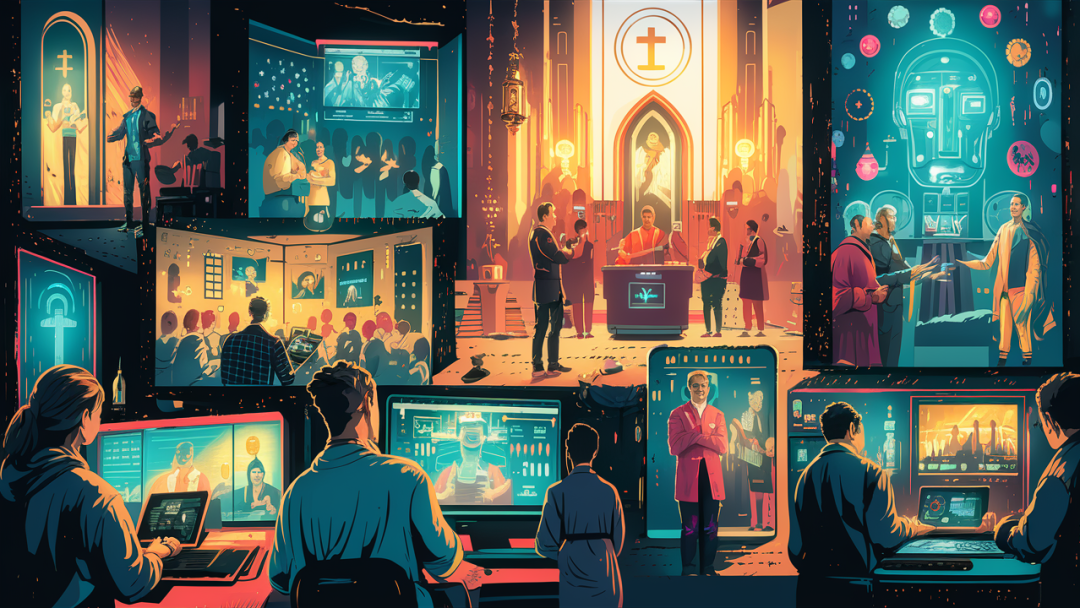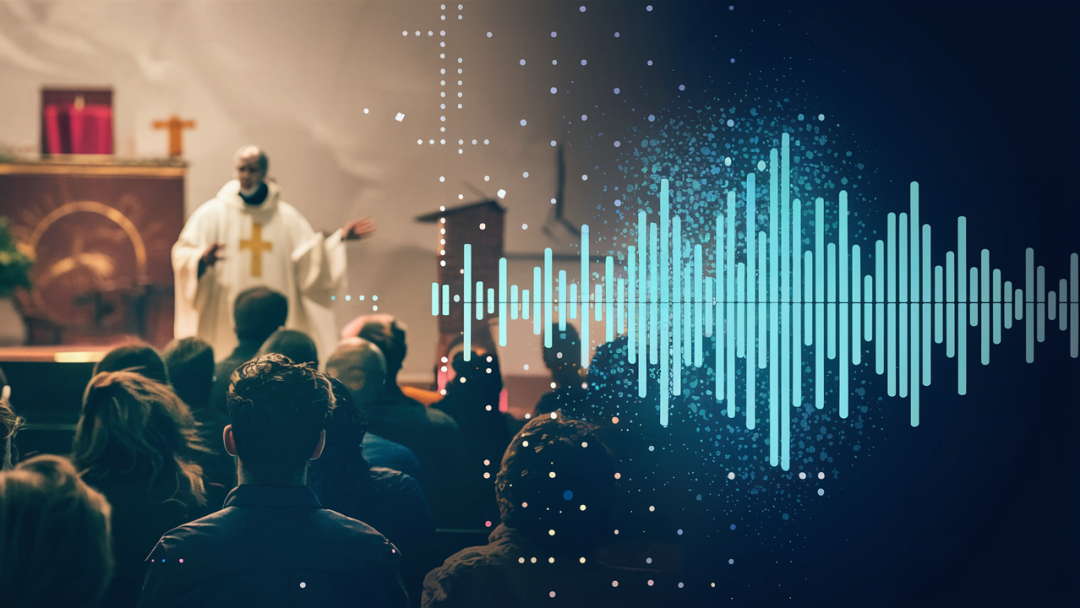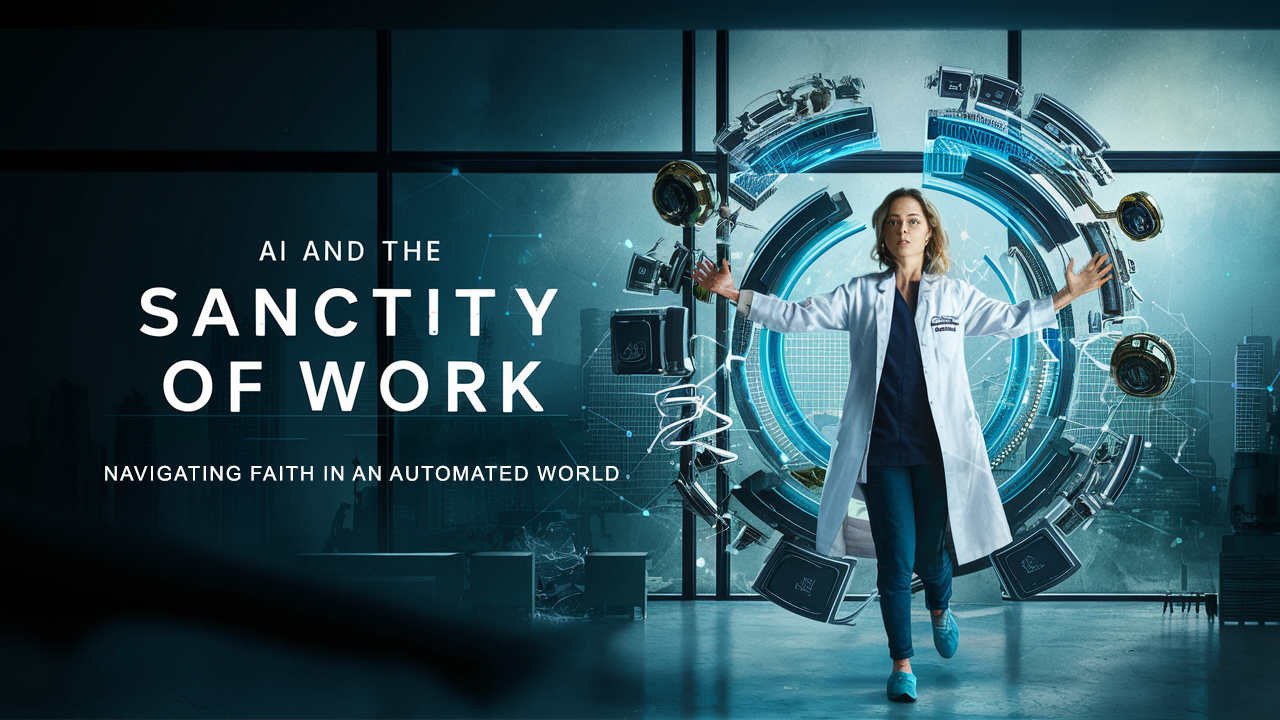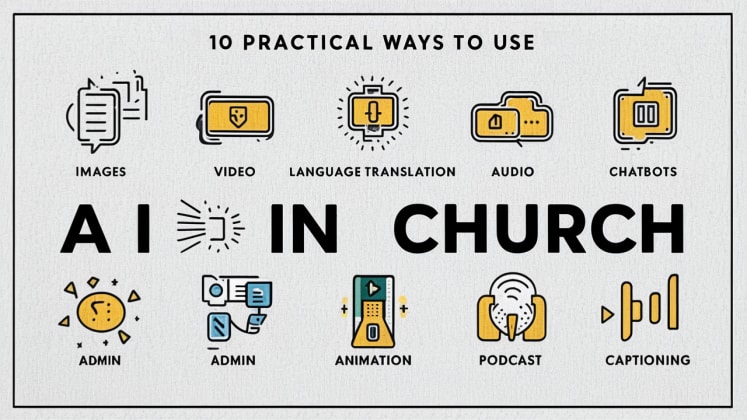Last Sunday, I stood in my church watching our worship leader introduce a new song andone that had been partially generated by AI. The melody was beautiful, the lyrics theologically sound, yet something felt different. As a software developer who's deeply involved in AI development and a small group leader who values authentic spiritual connection, I found myself wrestling with a question that's becoming increasingly urgent: Are we enhancing worship through technology, or slowly replacing the sacred with the synthetic?
The statistics are staggering: over 60% of U.S. churches have adopted some form of AI-based technology in their services as of 2025. From AI-generated worship songs to virtual pastors delivering sermons, technology is reshaping how we gather, sing, and encounter God. But unlike adding a digital projector or live-streaming services, AI's integration into worship raises profound theological questions about authenticity, human creativity, and the very nature of worship itself.
In this article, we'll journey together through the complex intersection of AI and Christian worship. We'll examine AI-generated music, virtual worship services, sermon preparation tools, and liturgy planning software. More importantly, we'll grapple with the theological implications and practical wisdom needed to navigate this technological revolution without losing the heart of worship: genuine connection with God and one another.
Whether you're a worship leader curious about AI tools, a pastor concerned about authenticity, or a believer trying to understand these changes, I want to share what I've learned through both my technical expertise and my lived experience in the Church. Let's walk through this together with wisdom, discernment, and hope.
The Rise of AI in Worship Music

AI-Powered Worship Song Generators
The landscape of worship music creation has been fundamentally transformed by artificial intelligence. Platforms like worship.ai, Suno AI, Neume, and Udio now enable anyone;from experienced worship leaders to musically inexperienced pastors.to generate complete worship songs in minutes.
These tools work by analyzing thousands of existing worship songs, understanding melodic patterns, lyrical themes, chord progressions, and spiritual vocabulary. Input a biblical theme or Scripture passage, and within moments you receive a fully-produced track complete with vocals, instrumentation, and lyrics rooted in theological concepts.
According to recent data, churches using AI worship generation tools report creating 3-5x more original worship content compared to traditional methods, with significantly reduced production time and costs.
Real-World Applications in Churches
I've personally witnessed how churches are implementing these technologies:
1. Sermon-Specific Songs: A pastor in Texas told me they now generate custom worship songs that directly tie into each sermon series. Rather than searching for existing songs that kind of fit the message, they create perfectly aligned worship experiences that reinforce the biblical themes being taught.
2. Kids' Ministry Music: Children's ministry leaders are using AI to create simple, catchy songs that teach biblical concepts. One church I consulted with generated 12 original kids' songs in a single afternoon.work that would have previously required months and thousands of dollars in professional production.
3. Multilingual Worship: Churches serving diverse communities use AI to translate worship songs while maintaining theological accuracy and musical flow. The technology enables authentic worship in multiple languages without requiring bilingual songwriters.
4. Background Music for Videos: Rather than navigating copyright complexities, churches generate original instrumental tracks for announcement videos, testimony recordings, and social media content.
The Quality Question
Here's what surprised me most: the quality is remarkably good. I've listened to dozens of AI-generated worship songs, and many are indistinguishable from human-created contemporary worship music. The melodies are memorable, the lyrics are biblically grounded, and the production quality rivals professional studios.
Hillsong Church, one of the world's most influential worship music producers, has experimented with AI-driven stage designs and music tracks. Life.Church uses AI to analyze worship trends and create more engaging worship experiences. These aren't fringe churches trying gimmicks.these are respected leaders in the worship movement.
Yet as a worship participant and someone who leads a small group, I can't shake the feeling that something intangible might be lost when we remove human struggle, divine inspiration, and lived experience from the creative process.
AI-Led Worship Services: The German Experiment

When the Preacher is a Chatbot
In June 2023, something unprecedented happened in Fürth, Germany. Theologian Jonas Simmerlein conducted an entire worship service using ChatGPT. An AI avatar appeared on large screens at the altar, leading prayers, reciting Scripture, and delivering a sermon on themes of mortality and faith.
The congregation of over 300 worshippers experienced something no generation before them had witnessed: a worship service where every element butprayers, sermon, benediction butwas generated and delivered by artificial intelligence.
I've watched recordings of this service multiple times, and I'm struck by both its technical impressiveness and its spiritual emptiness. The AI avatar spoke smoothly, quoted Scripture accurately, and maintained theological orthodoxy. Yet multiple attendees described the experience as "soulless" and "lacking the warmth of human connection."
Virtual Worship Experiences
Beyond this experimental service, AI is reshaping worship in more subtle ways:
AI-Powered Translation and Transcription: Many churches now use AI for real-time translation during services, making worship accessible to international attendees and the hearing impaired. This is technology serving the biblical mandate of hospitality and inclusion.
Chatbot Chaplains: Some ministries deploy AI chatbots as "always-available virtual chaplains" for people struggling with grief, depression, or spiritual questions. These bots can quote Scripture, offer prayer prompts, and provide theological resources 24/7 without human fatigue.
Personalized Worship Playlists: AI algorithms analyze individual worship preferences, spiritual maturity levels, and current life circumstances to curate personalized worship experiences for home devotions or small groups.
The Authenticity Crisis
Here's where my software developer brain clashes with my worship leader heart: Can a machine truly lead worship?
Worship, at its core, is about authentic response to God's character and work. It emerges from genuine encounter, personal transformation, and lived faith. The psalmist writes from experience ordeliverance from enemies, forgiveness of sin, awe at creation. The great hymn writers composed from deep wells of suffering, joy, doubt, and assurance.
An AI has experienced none of this. It can simulate the language of faith, but it cannot embody faith itself. It can generate theologically accurate statements about grace, but it has never needed grace. It can describe redemption, but it has never been redeemed.
As one theologian put it: "AI cannot stop the worship service by the Holy Spirit's conviction and call the congregation to repentance. It cannot pray in faith that God will heal. It cannot manifest any of the gifts of the Spirit for the common good."
This isn't about being anti-technology;I build AI tools professionally. This is about recognizing that some aspects of human experience cannot and should not be outsourced to machines, no matter how sophisticated they become.
Sermon Preparation and Liturgy Planning

AI as the Pastor's Research Assistant
Let me be clear about something: AI-powered sermon preparation tools are genuinely helpful. As someone who prepares weekly Bible study lessons for my small group, I've used several of these platforms, and they've significantly improved my preparation process.
Tools like SermonAI, Sermonly, SermonSpark, and Sermon Outline AI offer pastors:
- Biblical Context Research: Instant access to historical background, cultural context, and linguistic analysis of Scripture passages
- Sermon Outline Generation: AI-generated structures that pastors can customize and develop
- Illustration Suggestions: Relevant modern examples that connect ancient truths to contemporary life
- Character Studies: Comprehensive biblical character analyses
- Worship Integration: Suggestions for songs, prayers, and liturgical elements that align with sermon themes
These tools don't replace the Holy Spirit's leading or the pastor's theological training-they augment the research phase, giving pastors more time for prayer, meditation, and pastoral care.
The Logos Sermon Builder Integration
I use Logos Bible Software regularly, and their AI integration exemplifies healthy technology use in ministry. The Sermon Assistant provides suggestions while maintaining the pastor's creative control. It offers:
- Outline suggestions based on the biblical text
- Theological commentary from trusted sources
- Illustration ideas that pastors can adapt
- Application questions to provoke deeper thinking
- Liturgical day and season integration for churches following the church calendar
The key difference? The pastor remains the primary creator. AI serves, suggests, and supports-it doesn't replace the pastor's voice, theological perspective, or spiritual authority.
Liturgy Planning with AI
For churches that follow liturgical traditions, AI tools now assist in:
- Planning worship services that flow cohesively from gathering to sending
- Selecting readings that connect thematically across the Scripture texts
- Drafting prayers that can be customized for local context
- Creating responsive readings and confessions
- Coordinating music selections with the liturgical season
One Episcopal priest I interviewed described AI liturgy tools as "having a tireless assistant who knows the prayer book inside and out." She emphasized that she always personalizes the AI suggestions, adding specific prayers for congregation members, local concerns, and community needs.
This is where we need to think deeply about the nature of worship itself. Is worship primarily about correct content or authentic heart?

If worship is merely about saying the right words and singing accurate theology, then AI can assist. It can generate perfectly orthodox prayers, biblically sound song lyrics, and doctrinally correct sermons.
But Scripture suggests worship is fundamentally about relationship, encounter, and response. Consider these biblical principles:
Worship Must Come from the Heart:
"God is spirit, and those who worship him must worship in spirit and truth." - John 4:24
Worship Requires Genuine Experience:
"Come and hear, all you who fear God; let me tell you what he has done for me." - Psalm 66:16
Worship Involves Costly Sacrifice:
"I will not sacrifice to the Lord my God burnt offerings that cost me nothing." - 2 Samuel 24:24
Worship Flows from Transformation:
"Therefore, I urge you, brothers and sisters, in view of God's mercy, to offer your bodies as a living sacrifice, holy and pleasing to God,this is your true and proper worship." - Romans 12:1
The Problem with Algorithmic Worship
AI-generated worship content faces a fundamental problem: it emerges from pattern recognition, not personal transformation.
This brings us to a practical question: If an AI generates a theologically sound, musically beautiful worship song, can we legitimately use it in corporate worship?
I've wrestled with this personally, and here's where I've landed:
Yes, with important caveats:
- Human Curation: The song should be carefully reviewed by spiritually mature leaders for theological accuracy and appropriateness
- Contextual Adaptation: The song should be adapted to fit the specific congregation's needs, culture, and spiritual season
- Honest Disclosure: Congregations should know when AI-generated content is being used
- Supplementary, Not Primary: AI-generated songs should complement, not replace, human-created worship
- Spirit-Led Selection: The decision to use any song.AI or human-generated orshould be guided by prayerful discernment
The key is recognizing that the medium of creation matters less than the authenticity of use. If a worship leader prayerfully selects an AI-generated song because it genuinely expresses the congregation's heart toward God, that can be legitimate worship. But if AI is used merely for convenience or novelty, we've lost the plot.
The Human Element: What AI Cannot Replace

The Ministry of Presence
Last month, a member of my small group experienced a devastating miscarriage. As we gathered to pray and grieve together, I was reminded of something crucial: ministry is fundamentally about presence.
AI can generate a beautiful prayer for grief. It can compile Scripture verses about God's comfort. It can even create a playlist of appropriate worship songs. But it cannot:
- Hold someone while they cry
- Sit in uncomfortable silence that communicates "I'm with you in this pain"
- Discern when to speak and when to simply be
- Embody Christ's love through physical presence
Paul writes in Romans 12:15: "Rejoice with those who rejoice; mourn with those who mourn." This requires embodied, empathetic presence andsomething no algorithm can provide.
The Gift of Embodied Worship
Worship isn't just a mental or emotional activity,it's deeply physical. We kneel in repentance, raise hands in surrender, embrace in fellowship, break bread together, immerse in baptismal waters. These embodied practices are essential to Christian formation.
Virtual worship experiences, while sometimes necessary (as we learned during the pandemic), cannot fully replace gathering in physical space. Hebrews 10:24-25 reminds us:
"And let us consider how to stir up one another to love and good works, not neglecting to meet together, as is the habit of some, but encouraging one another, and all the more as you see the Day drawing near."
The writer emphasizes physical gathering, mutual encouragement, and visible community. These elements get diminished when worship becomes primarily virtual or AI-mediated.
The Irreplaceable Role of Spiritual Gifts
One of the most compelling theological arguments against AI-led worship comes from Paul's teaching on spiritual gifts. In 1 Corinthians 12, Paul describes how the Spirit distributes different gifts to members of the body for the common good:
- Prophecy - speaking God's timely word to specific situations
- Words of knowledge - Spirit-given insight into circumstances
- Faith - supernatural confidence in God's promises
- Healing - praying for and seeing God's restorative power
- Discernment - recognizing spiritual realities
- Teaching - explaining Scripture with Spirit-illuminated understanding
These gifts operate through human vessels yielded to the Holy Spirit. An AI cannot be filled with the Spirit, cannot receive prophetic revelation, cannot exercise discernment, and cannot manifest spiritual gifts.
When we replace human worship leaders with AI, we're not just swapping one method for another.we're removing the possibility of Spirit-empowered ministry that God intended for the gathered church.
The Value of Human Imperfection

Here's something counterintuitive: imperfect human worship is often more spiritually powerful than technically perfect AI worship.
I think of times when our worship leader has forgotten lyrics, when the sound system failed, when someone sang off-key. In those moments, the focus shifted from performance to authentic encounter. We laughed together, extended grace, and remembered that God looks at the heart, it can never deliver the beautiful imperfection of human worship.
Practical Wisdom for Churches
Establishing Healthy Boundaries
Based on my experience as both a developer and church leader, I recommend these boundaries for AI use in worship:
1. The 80/20 Principle: Let AI assist with up to 20% of preparation work (research, initial drafts, technical tasks), but ensure 80% comes from human creativity, prayer, and Spirit-led discernment.
2. Transparency Policy: Be honest with your congregation about how and when AI is being used. Trust is built on transparency.
3. Theological Review: All AI-generated content should be reviewed by theologically trained leaders before use in worship.
4. Human-First Decision Making: Use AI to generate options, but let humans make final selections based on pastoral wisdom and spiritual discernment.
5. Regular Tech Fasts: Periodically practice worship without any AI assistance to maintain your ability to lead worship without technological dependence.
Questions for Discernment
Before implementing AI in worship, church leaders should ask:
| Question | Why It Matters |
|---|---|
| Does this enhance or replace human creativity? | AI should augment, not substitute, human gifts |
| Are we using this for convenience or spiritual benefit? | Motive matters in worship decisions |
| How does this affect our congregation's spiritual formation? | Technology shapes how we encounter God |
| Are we maintaining authentic community? | Digital tools can sometimes diminish real connection |
| Does this align with our theological convictions about worship? | Practice should flow from theology |
| What are we losing by adopting this technology? | Every technology trade-off involves both gains and losses |
| How do we maintain dependence on the Holy Spirit? | Tools should serve, not replace, Spirit-led worship |
Different Church Contexts
The appropriate use of AI varies by church context:
Smaller Churches: AI tools can help resource-limited churches create quality worship content they couldn't otherwise afford. But they must guard against losing the intimacy and authenticity that often characterizes small church worship.
Larger Churches: While larger churches have more resources, they face pressure to constantly produce innovative, professional-quality experiences. AI can assist, but these churches must resist the temptation to prioritize production value over authenticity.
Church Plants: New churches might leverage AI for rapid content creation as they establish their identity. they should ensure their foundational DNA is built on authentic community, not technological sophistication.
Multi-Site Churches: AI can help maintain consistency across campuses while allowing for local contextualization. The challenge is preserving the unique personality and pastoral care of each location.
A Vision for Faithful Technology Use
AI as Tool, Not Replacement
I'm convinced that the healthiest approach treats AI as a sophisticated tool in service of human worship leadership, not a replacement for it.
Think of AI like a musical instrument. A piano doesn't compose music,it enables a musician to express creativity. A guitar doesn't worship-it facilitates a worshipper's praise. Similarly, AI doesn't lead worship orit equips human worship leaders to serve more effectively.
This perspective keeps technology in its proper place: subordinate to human creativity, spiritual discernment, and authentic encounter with God.
Learning from Church History
The church has navigated technological change before:
- Printing press (1450s): Enabled mass Bible distribution but raised concerns about interpretation without church authority
- Radio (1920s): Allowed sermon broadcasting but couldn't replace gathered worship
- Television (1950s): Brought worship services to shut-ins but couldn't substitute for physical community
- Internet (1990s): Connected global Christianity but fragmented local churches
- Live streaming (2000s): Expanded reach but sometimes decreased commitment to physical gathering
In each case, the church learned to leverage the technology's benefits while mitigating its dangers. We can do the same with AI.
The key has always been maintaining the primacy of embodied community, authentic relationship, and Spirit-led encounter. Technology serves these ends orit doesn't replace them.
Characteristics of Faithful AI Integration
Drawing on both biblical principles and church history, here are marks of healthy AI use in worship:
1. Theologically Informed: Decisions about AI are grounded in biblical theology of worship, not mere pragmatism or technological enthusiasm.
2. Community-Centered: Technology serves to strengthen human connection, not replace it.
3. Spirit-Dependent: Church leaders maintain prayerful dependence on the Holy Spirit, refusing to let technological capability eclipse spiritual sensitivity.
4. Contextually Appropriate: AI use is adapted to the specific needs, culture, and maturity of each congregation.
5. Prophetically Cautious: Churches remain willing to critique and resist technology when it conflicts with Christian values or biblical mandates.
6. Missionally Focused: Technology is evaluated primarily by whether it helps the church fulfill the Great Commission and Great Commandment.
Addressing Common Concerns
"Won't AI Make Worship Impersonal?"
This is a legitimate concern, but it's not inevitable. AI makes worship impersonal only when we let it replace human elements rather than enhance them.
Compare two scenarios:
Scenario A (Unhealthy): A church replaces their worship leader with an AI-generated playlist, eliminates live musicians, and projects AI-created sermons. Human presence is minimized in favor of technical efficiency.
Scenario B (Healthy): A church uses AI to help their worship leader research song options, generate creative ideas for transitions, and discover new worship songs. The worship leader then prayerfully selects and personalizes these elements for their specific congregation.
Scenario B enhances worship without diminishing its personal nature. The technology serves human leadership and community connection.
"Isn't This Just the Same as Using Hymnals?"
Some argue that objecting to AI-generated worship is like objecting to hymnals;after all, hymnals contain songs written by people outside the local congregation.
But there's a critical difference: hymnal authors were real people with real faith journeys. When we sing "It Is Well With My Soul," we're singing the words of Horatio Spafford, who wrote them after losing his four daughters in a shipwreck. The song emerges from authentic suffering and authentic faith.
AI-generated songs lack this experiential foundation. They're statistically likely combinations of words based on pattern analysis, not expressions of lived faith.
That said, if an AI-generated song genuinely expresses a congregation's heart and is used with intentionality and discernment, it can serve a legitimate purpose;just as a hymnal song can.
"What About Churches That Can't Afford Professional Musicians?"
This is where AI offers genuine benefit. Churches in rural areas, developing countries, or economically disadvantaged communities often lack access to trained musicians, sound equipment, and worship resources.
For these churches, AI tools can provide:
- Backing tracks for congregational singing
- Teaching resources for developing worship leaders
- Translation tools for multilingual worship
- Sermon preparation assistance for bi-vocational pastors
The key is using these tools to empower local worship leadership, not replace it. A church might use AI-generated backing tracks while still having a local worship leader who selects songs, leads the congregation, and exercises spiritual discernment.
"Aren't You Just Being a Luddite?"
I understand this concern andafter all, I'm a software developer who works with AI professionally. I'm biblical wisdom calls us to test everything and hold fast to what is good (1 Thessalonians 5:21). Not all technological advancement represents progress in God's kingdom. Some innovations, despite their sophistication, might actually hinder spiritual formation or dilute authentic worship.
Being thoughtfully critical about AI in worship isn't Luddism butit's faithful stewardship of worship practices that have nurtured Christians for millennia.
The Path Forward: Integration with Integrity
Recommended Implementation Strategy
For churches considering AI integration into worship, I suggest this phased approach:
Phase 1: Education (2-3 months)
- Educate church leadership about AI capabilities and limitations
- Study biblical theology of worship and technology
- Discuss theological and practical implications
- Gather input from congregation members
Phase 2: Experimentation (3-6 months)
- Begin with low-risk applications (background music for videos, sermon research)
- Document experiences, both positive and negative
- Regularly evaluate impact on spiritual vitality and community connection
- Adjust approach based on feedback
Phase 3: Evaluation (Ongoing)
- Regularly assess whether AI use is enhancing or diminishing authentic worship
- Maintain accountability structures for technology decisions
- Be willing to reduce or eliminate AI use if it's not serving spiritual goals
- Continue theological reflection on technology and worship
Creating Accountability Structures
Churches should establish clear accountability for AI use in worship:
- Technology Review Team: A small group including pastors, worship leaders, and tech-savvy members who evaluate AI implementation
- Regular Audits: Quarterly reviews of how AI is being used and its impact on worship
- Congregational Feedback: Mechanisms for members to share concerns or observations
- Denominational Guidelines: Where applicable, seek guidance from broader church bodies
- External Consultation: Periodically invite outside perspectives from theologians or worship experts
Maintaining the Sacred Center
Ultimately, our goal isn't to ban AI or to embrace it uncritically. Our goal is to maintain the sacred center of Christian worship: authentic encounter with the living God in the context of Spirit-filled community.
Every decision about AI in worship should be evaluated against these questions:
- Does this help us love God more fully?
- Does this help us love one another more authentically?
- Does this facilitate the Holy Spirit's work in our midst?
- Does this contribute to our spiritual formation in Christlikeness?
- Does this enhance our mission to make disciples?
If the answer is yes, the technology may be a gift to steward wisely. If the answer is no andor even uncertain-we should proceed with extreme caution or refrain entirely.
My Personal Conviction
As I've researched, experimented with, and reflected on AI in worship, I've come to this personal conviction:
AI can be a useful servant but must never become the master of Christian worship.
I use AI tools in my work, including my development of FaithGPT buttools designed to help people understand Scripture better and engage with their faith more deeply. I see genuine value in technology that serves spiritual growth.
But when it comes to worship itself orthe corporate gathering of God's people to encounter Him, celebrate His goodness, and be formed into His likeness.I believe we must maintain the primacy of human presence, authentic experience, and Spirit-empowered ministry.
Let AI assist with research, logistics, and technical production. Let it help resource-constrained churches access quality content. Let it translate worship into multiple languages and make services accessible to people with disabilities.
But let us never replace the human worship leader who worships in spirit and truth, the pastor who speaks from personal encounter with Scripture, the community that embodies Christ's love through physical presence, or the Holy Spirit's irreplaceable work in our gathered assemblies.
Conclusion: Enhancing, Not Replacing
So, is AI enhancing or replacing the sacred in Christian worship?
The answer depends entirely on how we choose to use it.
Used wisely, with theological grounding, clear boundaries, and spiritual discernment, AI can enhance our worship by freeing up time for prayer, expanding access to quality resources, and enabling creative expression that would otherwise be impossible.
Used carelessly, with prioritization of convenience over authenticity, AI can erode the very elements that make Christian worship transformative: human presence, authentic experience, Spirit-led spontaneity, and embodied community.
The choice is ours. And it's a choice we must make continually, as technology evolves and new possibilities emerge.
"Do be transformed by the renewing of your mind. Then you will be able to test and approve what God's will is buthis good, pleasing and perfect will." - Romans 12:2
As we navigate this technological moment, let us test everything, hold fast to what is good, and refuse to sacrifice the sacred on the altar of innovation.
Let us use AI as a tool to serve God's purposes, while maintaining our dependence on the Holy Spirit, our commitment to authentic community, and our conviction that true worship flows from transformed hearts, not sophisticated algorithms.
The future of Christian worship need not be a binary choice between rejecting all technology or embracing it uncritically. There is a third way: the way of wisdom, discernment, and faithful stewardship that honors both God's truth and the technological gifts He's allowed us to develop.
May we have the courage to walk that path together, for His glory and our spiritual good.
Frequently Asked Questions
Can AI-generated worship music be considered authentic worship?
Authenticity in worship about the heart posture of those using it. An AI-generated song can facilitate authentic worship if it's prayerfully selected, theologically sound, and genuinely expresses the congregation's heart toward God. the absence of human experience behind the creation is a legitimate concern that requires thoughtful discernment.
Should churches disclose when they use AI-generated content in worship?
Yes, transparency is essential for maintaining trust. Congregations should know when AI-generated music, prayers, or sermon elements are being used. This disclosure doesn't need to be disruptive anda simple note in the bulletin or periodic announcements about the church's approach to technology can suffice. Transparency demonstrates respect for the congregation and invites healthy dialogue about technology use.
Is using AI for sermon preparation different from using a commentary?
There are similarities and differences. Both are tools that assist pastoral preparation. commentaries are written by identifiable theologians whose qualifications, biases, and theological perspectives can be evaluated. AI aggregates patterns from vast datasets without clear attribution, making it harder to assess the theological perspective informing its suggestions. Pastors should use AI more cautiously than trusted commentaries, always verifying AI suggestions against Scripture and sound theology.
For resource-limited churches, AI tools can be genuinely beneficial, providing backing tracks, song suggestions, and worship resources that would otherwise be inaccessible. The key is using AI to empower local worship leadership rather than replace human presence entirely. Even with AI backing tracks, having a local worship leader who exercises spiritual discernment and pastoral sensitivity is crucial.
Can AI replace traditional hymnals?
This question conflates two issues. Digital hymnals (with or without AI curation) are different from AI-generated hymns. Digital hymnals are simply a delivery method for human-written songs butlike moving from print books to screens. AI-generated hymns raise deeper questions about authorship, authenticity, and the role of human experience in worship music creation. Churches might use digital hymnals while still being cautious about AI-generated content.
Watch for these warning signs: decreased spiritual vitality, reduced human connection, increased focus on production quality over authenticity, declining participation in embodied practices (like corporate singing or physical presence), loss of spontaneity or Spirit-led moments, and growing dependence on technology for basic worship functions. Regular evaluation with church leadership and honest congregational feedback can help identify these issues early.
The Bible doesn't directly address modern technology, but it offers principles for worship that inform our technology decisions: worship must be in spirit and truth (John 4:24), should involve authentic heart engagement (Matthew 15:8-9), requires embodied community (Hebrews 10:24-25), and depends on the Holy Spirit's work (1 Corinthians 12). Any technology use should be evaluated against these biblical principles.
Should worship leaders learn to use AI tools?
Yes, with appropriate boundaries. Just as worship leaders learn to use sound systems, projection software, and digital music libraries, understanding AI tools is becoming part of basic technological literacy. AI tool proficiency should never replace spiritual formation, theological training, or pastoral sensitivity. Think of AI literacy as one tool in a much larger toolkit for faithful worship leadership.







